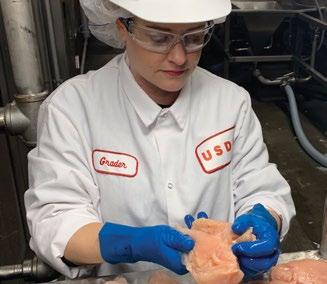
8 minute read
Food Safety: Adventures in Grading
from Arkansas Grown
Arkansas Food Safety Poultry Inspectors Ensure Quality Foods
The poultry industry is the largest sector of Arkansas agriculture, providing more than $4.9 billion in cash receipts in 2018. Arkansas nationally ranked second in broiler chicken production and fifth in turkey production. With that production comes a need for grading, inspection, and certification of poultry products.
Advertisement
In 2019, 1.73 billion pounds of chicken meat, 776 million pounds of turkey meat, 1.34 billion pounds of rabbit meat, and 1.52 billion eggs were inspected by the Food Safety / Egg and Poultry Section of the Arkansas Department of Agriculture’s Livestock and Poultry Division. The Food Safety Section has 36 employees, graders, and inspectors that provide commodity grading, inspection, and certification of poultry, turkey, eggs, and rabbits under a Cooperative Agreement with USDA Agricultural Marketing Service and in compliance with the Arkansas Egg Marketing Act. Thirty-five of the employees are licensed by the USDA.
“Every day is an adventure in grading,” said Sara Overton, an Agriculture Commodity Compliance Specialist, better known as a grader, with the Arkansas Department of Agriculture. “You have to be flexible, and spontaneous, and a person who can figure things out by themselves.”
The Food Safety Section strives to protect consumers and the agricultural industry by ensuring that poultry, eggs, and rabbit products offered to the public are safe, wholesome, and properly labeled. Graders provide service at processing plants to assure food safety and food quality. Inspectors provide auditing services at retail outlets for regulatory compliance on eggs, ensuring the products are properly graded and labeled according to State and Federal guidelines.
“People need to feel safe and understand that there are people looking out for them when it comes to the food they eat, I like to reassure people of that,” said Overton.
Overton works as a relief grader who fills in vacancies at poultry plants. She travels between plants, like Tyson and Butterball, to ensure quality. She even inspects at Pel-Freez in Rogers, the largest processor of rabbit meat in the United States. The job for her is different every day, but she says she likes getting to see how each company makes their products. She is certified in all four licenses available in Arkansas: chicken, turkey, eggs, and rabbit.
Graders and inspectors provide an additional layer of quality certification for consumer food products. A product that is USDA Shielded means a third-party person pulled it off the line at a processing location or freezer facility and verified its quality.
“It’s kind of like having a third-party impartial person to go ‘yes those are the best eggs you can buy,’” said Overton. “I want people to know there are people out there taking care of them. How many people do you meet every day who know how to tell if their eggs are shaped correctly? Everyone still eats them and trusts they’re good. They can trust that because there are so many different types of accountability going into the food system. You have government going in and checking the quality, and you have corporations going in and checking the quality too.”
Staff within the Food Safety / Egg and Poultry Section participate in government food inspection programs. In 2019, under the Child Nutrition Labeling Program (CN), staff performed 12 audits on manufacturers producing CN products, and inspectors graded and certified over 13 million pounds of CN products. Certified auditors performed 44 audits under the Food Defense Program on manufacturers and off-site storage facilities. Section inspectors inspected 36 processing locations and examined 30.7 million eggs under the Shell Egg Surveillance Program.

“Our Food Safety staff takes their responsibility seriously,” said Overton.
In 2018, one billion broilers were raised in Arkansas and processed for distribution across the nation. Demand for poultry continues to increase domestically and globally.
“The need for grading, inspection, and certification will increase as production and demand for poultry increases. We will be there and continue to do our part to reassure consumers that they are getting safe and quality products,” said Overton.

Learn more about the Food Safety / Egg and Poultry Section at agriculture.arkansas.gov.

NATURAL RESOURCES OVERVIEW
Soil Conservation, Nutrient Management, Water Rights, Dam Safety, Water Resources Planning and Development
In 2018, more than 1,500 new water wells were constructed and reported to the Ground Water Section.
Floodplain Management Section
Conservation Section
The Natural Resources Division is guided by the Arkansas Water Plan, a long-term strategy designed to lead the conservation, development, management, and use of water for all citizens.
The Plan brings data, science, and public input together to define water demands, water supplies, issues, and potential solutions to meet our future needs.
State Water Planning Section
Water Resources Development Section Ground Water Section Dam Safety Section
Nonpoint Source/ Unpaved Roads Section
14 Nine-Element Watershed Management plans were developed intended to help reduce sediment runoff
137 dam inspections over the past year provided details to dam owners on deficiencies and how to address them
73 municipalities were assisted in their mission to obtain safe drinking and sewer water
More than 250 cities & towns were equipped and trained to address floods
411 Nutrient Management Plans for communities across Arkansas were developed
140 applications were received and 70 certificates of project completion were issued over the past five years

Homegrown By Heroes: Boots On The Ground
Recognizing Arkansas Veterans Who Work in Agriculture
The transition from soldier to farmer was an easy choice for Damon Helton. “Veterans do not mind getting dirty. Veterans are familiar with getting up early, and following directions really well. But we also have the ability to think on our feet to find quick solutions,” said Helton, who raises livestock, poultry, and produce on 165 acres in rural Saline County. “There is an amazing healing aspect to working the land you fought and cared for and growing things on the land you have sweat equity in,” he said. Helton is a former Army Ranger who served five tours of duty in Afghanistan and Iraq. A member of the nonprofit Farmer Veteran Coalition, Helton is one of 49 participants in the Arkansas Department of Agriculture’s Homegrown by Heroes Program. Homegrown by Heroes identifies agricultural products grown or raised by veterans with a special retail label. To Helton, the “Homegrown by Heroes” label is a honor fitting of the men and women who served our country and an appropriate marker for consumers who seek to honor their service. “It’s a phenomenal opportunity for veterans. It is a marketing tool that we have paid for with our service,” he said. “The Homegrown by Heroes label allows the veteran a platform for their products and the consumer an opportunity to show their support.” Veterans who are farmers and would like the Homegrown by Heroes designation on their products must first become a member of the Farmer Veteran Coalition. After that, they may join the program through the Arkansas Department of Agriculture. The Arkansas Agriculture Board welcomes Helton as the first Homegrown by Heroes member to serve on the board.
Helton applies the label on all products he produces, including 100% grass-fed beef, forested pork, and pastured poultry. Helton quipped that his hogs are “like employees of the farm because they help in timber management.” Helton’s beef, pork, and poultry along with eggs and a variety of vegetables produced on his family’s farm are sold at three Olde Crow General Store locations operated by Helton and his wife, Jana. The Helton’s opened the first Olde Crow in October, 2015, at the intersection of Arkansas Highway 9 and Arkansas Highway 5 in the Crows community. The specialty store and café sits at the former site of the Crows gas station. They have added locations in Benton and Hot Springs. Helton refuses to take credit for the success of the stores. He said farmers, vendors, and consumers in the community need an alternative to only purchasing locally farmed and raised goods than just a seasonal farmer’s market and local consumers craved quality products. “It’s a phenomenal opportunity for veterans. It is a marketing tool that we have paid for with our service.”
Not long after Helton opened his first store, a local man came into the store boasting that he grew “the best tomatoes you’ve ever had.” The next growing season, Helton was buying tomatoes from the man to sell at the store. He gets contacted by area residents who make salsa or pickles or soaps.

Helton understands the parallels between how he and his family are helping others in the community and how that service started with his military career.

FISCAL
HUMAN RESOURCES
MARKETING
INFORMATION TECHNOLOGY
LEGAL
LAW ENFORCEMENT
SHARED SERVICES OVERVIEW
12,697 Vendor Invoices Processed
$3 Million in Federal Grant aid payments processed
$11 Million in Federal Grant aid reimbursements requested
506 positions filled
111 press releases issued
11 proclamations promoted
Upgraded to one gigabit fiber optic connection Agency-wide upgrade to Windows 10
Assisted in drafting proposed rules and monitored legislation throughout the legislative session
190 Law Enforcement Cases Closed
$386,941 Restitution returned to land owners
ACT 781 repeal resulting in the removal of 26 outdated rules
$3,280 Received in fines
165 Law Enforcement assists performed










